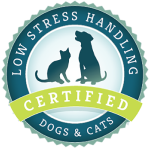The Low Stress Handling® Movement: How Sophia and Her CattleDog Started It All!
Feb 24 • CattleDog Publishing Newsletter, General Information, Pet Owner, Shelter Worker, Student, Trainer, Veterinary Professional

Being Low Stress Handling® Silver Certified demonstrates to clients and employers that you care about the wellbeing of the animals in your care.
Enroll Now Why and What is Low Stress HandlingCourtani P., LSHC-S 12/8/2018
MacKenzie D., LSHC-S 06/23/2020
Caroline C., LSHC-S 12/11/2018
Join our newsletter to receive educational Behavior Bytes®, Newsletters and special offers.